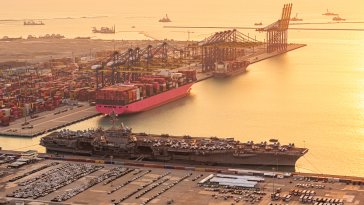
The perfect storm - Deglobalization's headwinds
- 07 Agosto 2024 (5 min read)
KEY POINTS
Globalization can be defined as the rising interconnection of the world’s economies and populations, driven by international trade in technology, services, goods, as well as the flow of investment and information. Globalization is now facing at least five different headwinds. Let me discuss them in turn and indicate how I believe they could be tackled.
Distribution effects
When discussing trade, it’s often said that while trade helps countries, sometimes workers and firms can still lose from it. This is not an incidental implication; trade is about producing where it is cheaper to do so, with the implication that some, more expensive domestic producers could suffer .
We know that trade is not the only source (or even the main source) of job losses. Yet, it is easier to identify the source of the losses and attribute the blame when it comes from higher imports or from the relocation of firms to other countries.
Why is the argument more salient now? One reason is the likely failure of the programs designed to help those workers who have lost jobs because of trade. Another is that the culprit behind the job losses is easier to identify when one can point to a specific country, like what happened with the “China shock” narrative. Reputable estimates suggest gross job losses as a result of rising Chinese import competition during the 1999–2011 period were in the range of 2.0 - 2.4 million1 – and given the distribution of these losses across states, plausibly resulted in Donald Trump’s presidential win in 2016. Another example is that of French farmers mobilizing against cheaper agricultural imports from Poland and Hungary and blaming European Union (EU) rules.
As is the case with the other forces discussed below, these concerns cannot be dismissed. Trade adjustment assistance programs have not worked and likely cannot work. Therefore, it could make sense to protect some sectors or workers on distribution grounds. For example, it may make sense to protect small French farmers, even if their products are more expensive. This would then likely cause higher prices for French consumers but could still be a socially acceptable price to pay to help avoid “geographic deserts” in the French countryside. In doing so, one of the most pressing issues would be how to do this without losing most of the gains from trade.
National security
As global geopolitical tensions have increased, avoiding dependence on non-friendly countries may be preferred. Consider the U.S. in relation to trade with China, the dependence of the world on rare earth minerals from politically unstable countries, or the global dependence on Taiwan for semi-conductors.
Germany decreasing its dependence on Russian gas over the last three years suggests that firms and countries can still adapt, change the method of production, and find alternative suppliers. Yet, adapting in the very short run to an embargo or ban can be difficult too.
Consider when national security is used to protect a specific sector, like in the case of the U.S. administration’s objections to the purchase of U.S. steel by Nippon Steel. Japan is not an enemy of the U.S., and the Pentagon buys less than 3% of the overall U.S. steel production.1
Economic security
Although the proportion of trade in intermediate goods has remained roughly constant over time, around 60% of total trade, global supply chains have become more complex, and thus potentially more exposed to failures along the chain.2
Examples include, floods in Thailand, the Fukushima disaster, pandemic disruptions, the Houthi attacks in the Red Sea, and the risk of closing of the strait of Hormuz. When considering similar events, there could be an increased need for on-shoring, or at least friend-shoring some activities.
The role of policy is less clear in this case, as one might assume that firms are best placed to assess the risks and reorganize their supply chains. However, network issues, not unlike those that played a role during the global financial crisis, may be relevant. Firms may know about their suppliers but not about their suppliers’ suppliers and so on. Or they could have a plan B, which happens to also be the same as other firms. This could lead to the alternative supplier they counted on being unable to supply. Thus, policy can play a useful role in examining the resilience of the system as a whole.
- VS5TLiBEZXBhcnRtZW50IG9mIENvbW1lcmNlICgxLzExLzE4KTogVS5TLiBEZXBhcnRtZW50IG9mIENvbW1lcmNlLiBCdXJlYXUgb2YgSW5kdXN0cnkgYW5kIFNlY3VyaXR5LiBPZmZpY2Ugb2YgVGVjaG5vbG9neSBFdmFsdWF0aW9u
- T0VDRCAoMTEvMy8yMDA5KTogVHJhZGUgaW4gSW50ZXJtZWRpYXRlIEdvb2RzIGFuZCBTZXJ2aWNlcw==
Industrial policy
For a long time, industrial policy had a bad name among economists, as it was seen by some as more likely to help lobbies than to make the right technological choices. Today, more economists more open minded for at least two reasons. First, the earlier position was too extreme, and there was often an economic case. China’s approach of strong subsidies for the solar panel and the electric vehicle (EV) industries has shown that moving faster than other countries can pay off. Additionally, the Advanced Research Projects Agency Network (ARPANET), the forerunner of the internet, is widely considered a great success and one with a large economic impact. Second, the new technologies, in particular artificial intelligence (AI), seem more likely to come with substantial externalities and strong increasing activities— two factors that could justify state intervention.
The issue is that the earlier worries are still relevant and industrial policy could be used for other purposes, primarily improving the competitiveness of domestic producers. This could be seen as a relevant motivation behind some of the subsidies in the Inflation Reduction Act, such as final assembly requirements for EVs or batteries.
Measures to fight global warming
The need for governments to take measures to fight global warming is widely accepted. The consensus is that the main tool should be carbon taxes or carbon fees on the use of brown energy. But, because such taxes are typically unpopular, an attractive alternative, outside of the budgetary implications, is subsidies for the use of green energy. Even leaving aside the budgetary implications, subsidies are not quite considered equivalent to taxes, but they could give the right incentives to increase the share of green energy in energy production.
The issue here is again implications for competitiveness. Europe has largely used carbon taxes and carbon fees. The U.S. instead has used subsidies. The result, at the prevailing exchange rate, is a loss of competitiveness for European firms, a problem which is not solved by the carbon border tax. If the carbon border tax were put in place, and if a U.S. firm and a EU firm both achieved zero emissions, the first as a result of taxes and the second as a result of subsidies, no border tax would be
collected, but the EU firm would lose competitiveness facing the U.S. firm.
Challenges ahead
Distribution effects, national security, economic security, industrial policy, and climate change all have its own implications, but all are likely to play a role in the decrease trade. Other forces not discussed at length include the use of tariffs as a substantial source of revenues and the old mercantilist view that countries should have positive current account surplus.
Some may come into conflict with each other. For example, should governments in their fight against global warming buy cheap Chinese solar panels, or should they put tariffs to protect their domestic producers and pay more? If the U.S. puts higher tariffs on Chinese EVs, leading China to try to increase sales elsewhere, especially in the EU, should the EU then also put higher tariffs, at the risk of Chinese retaliation against EU companies in China? Should higher tariffs on Chinese cars come with restrictions on foreign direct investment (FDI) by Chinese car companies in the EU, or instead encourage such tariff triggered FDI?
The correct economic answer is likely not an absolutist defense of free trade. Behind each of the five forces discussed include good and bad reasons for it to happen. It could sometimes make more sense to protect some sectors at the expense of consumers. Or it could make sense to worry about national and economic security. Industrial policy cannot be rejected out of hand and has implications for competitiveness. If carbon taxes are a political nonstarter, but the fight against global warming is existential, it may make sense to use subsidies. But, at the same time, in each case, there is a scope for misbehaving, for using the argument as a pretext for old fashioned protection.
Defining the right policies is thus a case-by-case job, working out both the cooperative and non-cooperative outcomes. The risks of retaliation, escalation, and trade wars are high, and with them could come an inefficient and costly deglobalization.
Disclaimer
This document has been issued by AXA IM Mexico, Asesores en Inversiones Independientes, S.A. de C.V., ("AXA IM Mexico") an independent financial advisor incorporated pursuant to the Securities Market Law. The information contained herein is consistent with the provisions contained in Article 6 of the Securities Market Law, in accordance with the provisions of Article 226, Section VIII of the same legal system.
This document and the information contained herein are intended for the exclusive use of sophisticated clients or institutional and/or qualified investors and should not be directed toward retail clients or individual investors. It has been prepared and published for informational purposes only at the exclusive request of the specified recipients and not intended for general circulation to the investing public. It is strictly confidential and must not be reproduced, distributed, circulated, redistributed or otherwise used, in whole or in part, in any way without the prior written consent of AXA IM Mexico. It is not intended for distribution to any person or jurisdiction for which it is prohibited.
To the fullest extent permitted by law, AXA IM Mexico does not warrant the accuracy or adequacy of any information contained herein and assumes no liability for errors or misstatements, whether due to negligence or any other reason. Such information may be subject to change without notice. The data contained herein, including but not limited to any backtesting, simulated performance history, scenario analysis, and investment instructions, are based on a number of key assumptions and inputs and are presented for indicative and/or illustrative purposes only.
This document has been prepared without regard to the specific personal circumstances, investment objectives, financial situation or particular needs of any particular person. Nothing contained herein shall constitute an offer to enter or a term or condition of any deal, transaction, contract or agreement with the recipient thereof or with any other party. This document shall not be construed as investment advice, tax or legal advice, or an offer to sell or solicitation to invest in a particular fund. If you are unsure of the meaning of any information contained herein, please consult your financial advisor or other professional advisor. The data, projections, forecasts, forecasts, assumptions and/or opinions expressed herein are subjective and are not necessarily used or followed by AXA IM Mexico or its affiliated companies which may act on their own opinions and as independent areas within the organization.
All investment activity involves risks. You should be aware that investments can increase or decrease in value and that past performance is not a guarantee of future returns, you may not receive the amount initially invested. Investors should not make any investment decisions based solely on this material.
If any fund is particularly highlighted in this communication (the "Fund"), its offering document, investment prospectus or key information document contains important information about sales restrictions and risk factors, you should read them carefully before entering into any transaction. It is your responsibility to be aware of and observe all applicable laws and regulations of any relevant jurisdiction. AXA IM Mexico does not intend to offer any Fund in any country where such an offering is prohibited.
To understand the full extent of the associated risks, please read the fund's prospectus and/or key information prospectus carefully.
AXA IM México, Asesores en Inversiones Independientes, S.A. de C.V. is registered in the Public Registry of Investment Advisors with folio number 30054-001-(14084)-20/05/2016, assigned by the National Banking and Securities Commission. In this regard, the National Banking and Securities Commission exclusively supervises the provision of securities portfolio management services when investment decisions are made in the name and on behalf of third parties, as well as the services consisting of providing investment advice on securities, analysis and issuance of investment recommendations on an individual basis. therefore, the National Banking and Securities Commission lacks the authority to supervise or regulate any other service that AXA IM Mexico may provide to its clients. Registration in the Public Registry of Investment Advisors maintained by the National Banking and Securities Commission in terms of the Securities Market Law, does not imply the adherence of AXA IM Mexico to the provisions applicable to the services provided, nor the accuracy or veracity of the information provided.
AXA IM Mexico, Asesores en Inversiones Independientes, S.A. de C.V., in accordance with the Securities Market Law, is prohibited from guaranteeing returns to its clients on their investments, as well as from receiving money or securities from its clients in deposit or custody.
Likewise, AXA IM Mexico does not receive remuneration from issuers or related persons for the promotion of securities, or from intermediaries in the national or foreign securities market.



